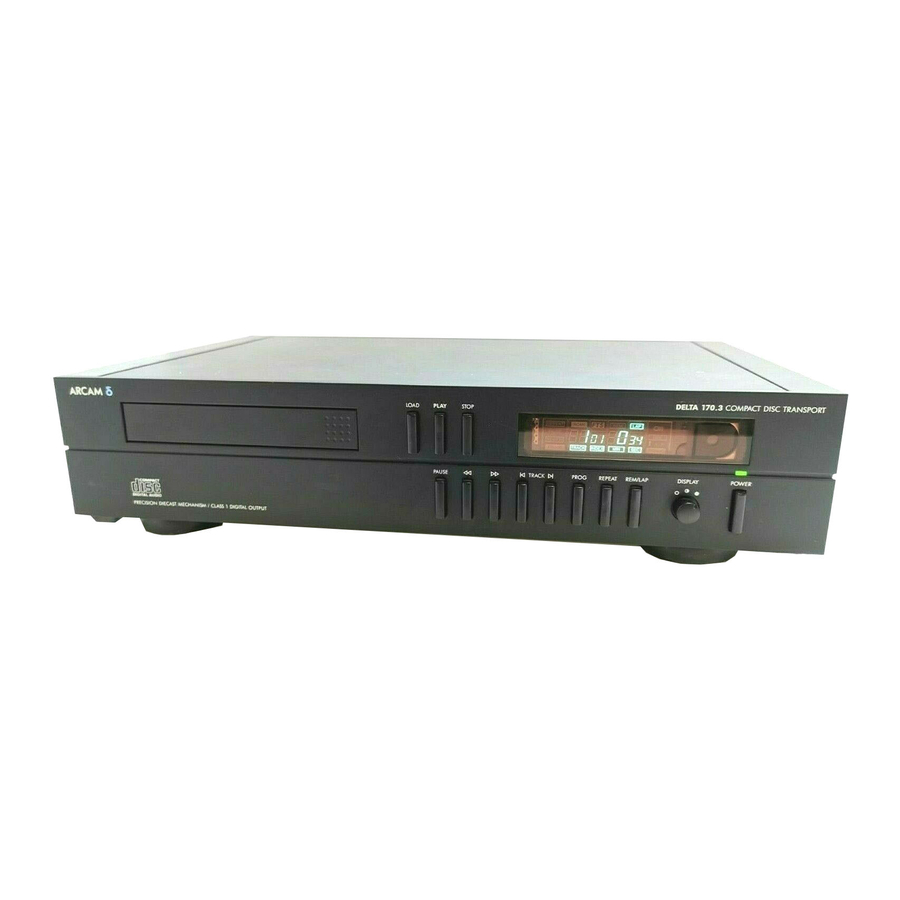Arcam Delta 70.2 Manual - Página 3
Procurar online ou descarregar pdf Manual para Leitor de CD Arcam Delta 70.2. Arcam Delta 70.2 12 páginas. Arcam cd player and cd transport handbook
Também para Arcam Delta 70.2: Manual (12 páginas)

The wire which is cotoured BLUE must be connected to the terminal
which is marked by the letter N or coloured BLACK or BLUE. The wire
which is coloured BROW/N must be connected to the terminal which is
marked by the letter L or coloured RED or BROWN.
Fuses
If the mains plug is fused fit a 3 amp fuse. All versions of the
Delta 70.2 and Delta 170 are fitted with an anti-surge mains fuse, rated
at 315mA for 220/240V players and 630mA for 100/1 10/120V players.
Should a mains fuse fail, SWITCH OFF THE PLAYER AND
DISCONNECT IT AT THE WALL SOCKET. The fuse always remains live
when the machine is plugged into the mains. Remove the top plate from
the player by unscrewing the two screws at the top of the rear panel
using a No 1 'Posidriv' screwdriver. Lift the top plate vertically and pull it
backwards slightly to release it. Fit a new fuse of the same type and
value in the fuse holder close to the mains inlet.
You should find a spare mains fuse in the spares kit provided
with the player or, alternatively, fitted inside the machine close to the
mains inlet.
If the new fuse fails we recommend that you return the
player to your dealer for investigation and possible repair.
Interaction with other equipment
Although the transformers used in the Delta CD machines
have a low and well controlled level of magnetic field radiation it is
possible that they may occasionally interfere with nearby sensitive
equipment, such as the cartridge inputs of an amplifier or the replay
circuitry of a cassette recorder. This interference normally manifests itseif
as a low level background hum, present when using the appropriate
equipment, but which disappears when the CD machine is turned off. If
this situation occurs and is annoying it can be eliminated by changing
the relative position of tne interacting items or, in extreme cases,
switching off the CD player when other items are in use. [It may be
useful to know that the transformers in the Delta 70.2 and Delta 170 are
located to the right of the unit).
A CD player may also radiate some r.f. (radio frequency}
signals, derived from its digital circuitry. Although within statutory limits
this can cause interference with nearby tuners and radios, especially on
the AM (Medium and Long) wavebands. To solve this problem move the
aerial of the tuner or radio away from the CD player, or re-orient it for
minimum interference pickup. In extreme cases switch off the CD player
when using your tuner or radio.
Disc Maintenance
Treat your CDs with care. If you always pick up a disc by its
edge and put it back in its case after use, cleaning should not be
necessary. Should fingerprints, dust or dirt appear, you can remove them
with a soft, lint free cloth, wiping the disc in a straight line from centre to
edge. Breathe on the disc lightly if necessary but do not use detergent,
abrasive cleaning agents or solutions designed for use on records.
Never write on the disc label; this can cause irreparable
damage as corrosive components present in inks can etch their way
through and destroy the information layer of the disc.
Player Maintenance
Clean the cabinet, when necessary, with a soft, damp cloth.
Do not use cleaning agents containing alcohol, spirits, ammonia or
abrasives. [For stubborn stains or fingermarks we have found the careful
application of "Windolene' to be particularly effective). Keep the disc tray
free of dust. With the exception of changing a fuse, do not attempt to
adjust or modify anything inside the player — this will void your
warranty.
In Case of Difficulty
Although the Arcam Delta CD machines have been
manufactured to the highest standards, the possibility remains that a
fauit could appear. However the cause of a problem will not always be
the player — apparent faults can arise because you are not yet fully
familiar with a complex new product, or simply from faulty discs.
There follows a list of possible faults and their causes (see
pages 10—11]. If you are unable to solve a problem after following our
guidelines, stop your investigation, disconnect your machine from the
mains and contact your dealer.
